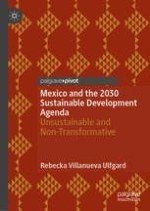This book explores how and why Mexico’s approach to the 2030 Agenda for Sustainable Development and Sustainable Development Goals (SDG) implementation with the López Obrador administration is unsustainable and non-transformative, overshadowed by his vision of Mexico’s “Fourth Transformation”. Approached as a super mantra revolving around “Republican Austerity” and “First, the poor”, it provides original analysis of structural and conjunctural challenges facing Mexico as regards People-, Planet-, and Peace-centered development. The book reveals the promise “First, the poor” is inconsistent with data on Mexico’s poverty reduction (SDG1). Despite record-high spending on social programs and unmatched coverage, the recent tendency of improvement in tackling poverty is rather ambiguous from the perspective of multidimensional poverty. The book covers access to clean energy (SDG7), resilient infrastructure and sustainable industrialization (SDG9), and safeguarding biodiversity (SDG15) by examining three megaproject case studies: the oil refinery Dos Bocas, the Interoceanic Corridor of the Isthmus of Tehuantepec, and the Maya Train, generating concern with the economic, environmental, and social dimensions of sustainable development. The prospects for an ‘enabling environment’ for SDG implementation are hampered by persistently high levels of homicides and impunity (SDG16). Turning Mexico’s Armed Forces into ‘first development partner of choice’ is problematized as regards their reach in infrastructure megaprojects and social welfare programs, in the overall context of the ‘de-risking state’ favoring private capital. The result, as determined by Villanueva Ulfgard, has led Mexico further astray from sustainable and transformative development.
